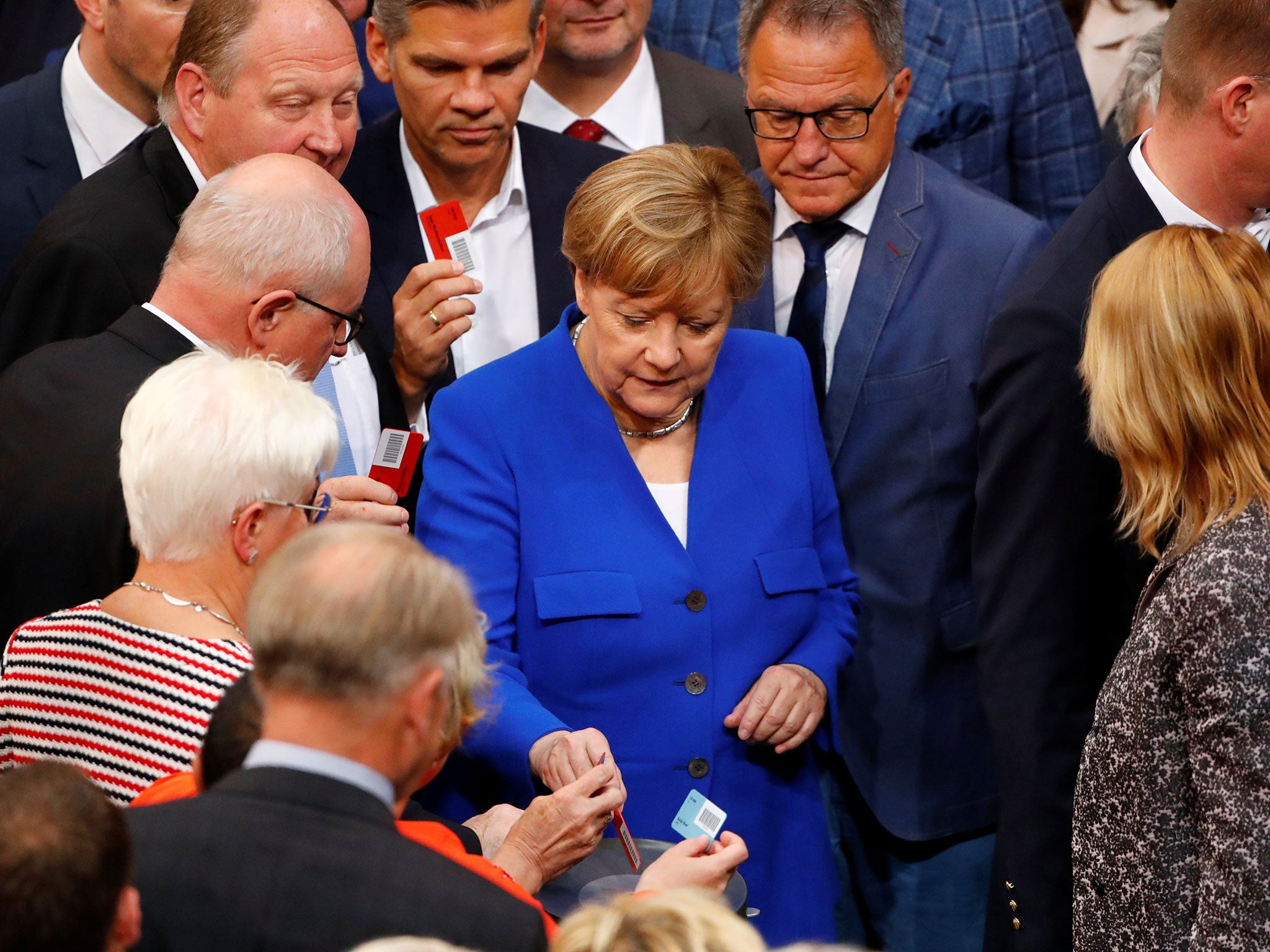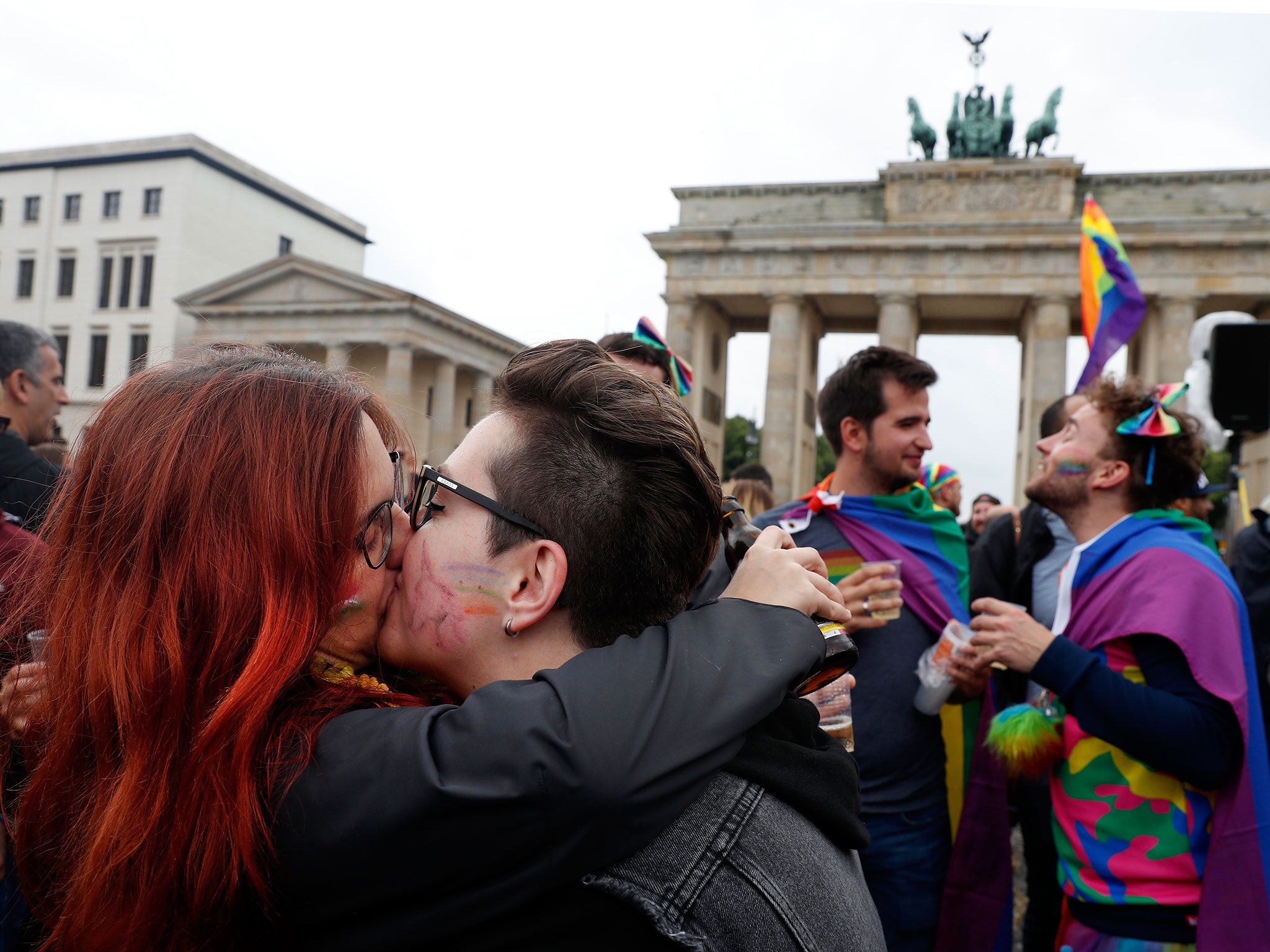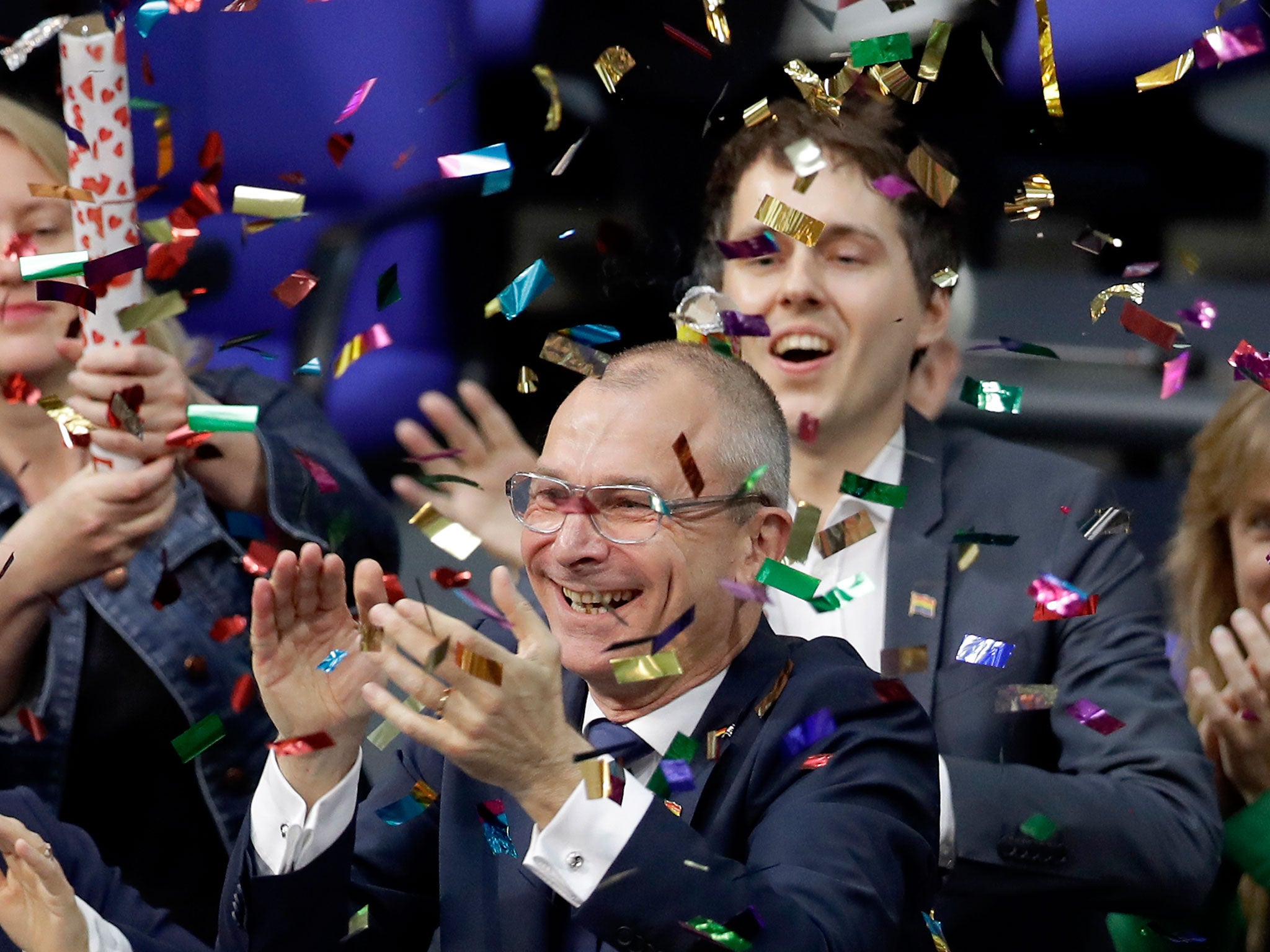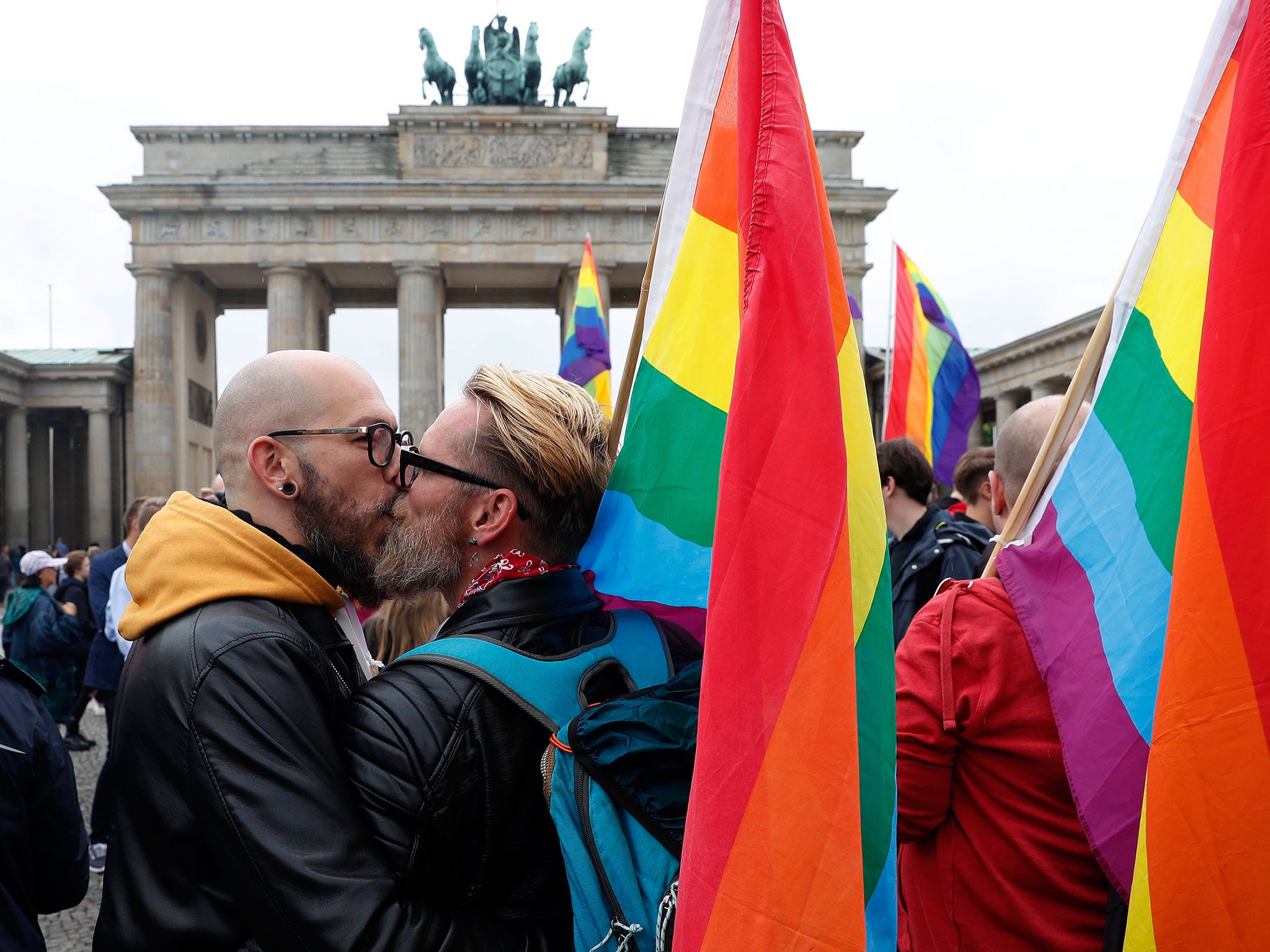German parliament votes to legalise same-sex marriage
‘Historic day’ for the Bundestag as members vote for draft law by 393 votes to 226
Germany’s parliament has voted to legalise same-sex marriage by 393 votes to 226, despite Angela Merkel opposing the move.
The German Chancellor was seen voting with a red card, indicating a no vote, at the end of a heated debate in the Bundestag.
“For me, marriage in German law is marriage between a man and a woman and that is why I did not vote in favour of this bill today,” she told reporters moments after the historic vote.
“I hope that the vote today not only promotes respect between different opinions but also brings more social cohesion and peace.”
The Chancellor said she supported the bill’s introduction of full adoption rights for same-sex couples – a move she had previously opposed – and was fighting anti-LGBT discrimination.
The issue has divided Ms Merkel’s Christian Democratic Union (CDU/CSU) party, which remains the largest in the German parliament and has shown comfortable poll leads ahead of September’s federal elections.
Political analysts said that despite condemnation from critics over her no vote, Ms Merkel had trodden a careful line on same-sex marriage.

While endearing herself to right-wing voters on a personal level, she ultimately allowed the vote to happen by freeing the centre-left Social Democratic Party (SPD) from their obligation as a coalition partner not to put the bill forward.
The party called the snap vote under an amendment entitled “marriage for all”, which was guaranteed majority support in the Bundestag with the combined backing of the SDP, The Left party and Greens.
Johannes Kahrs, an SPD politician known for his LGBT campaigning, launched a blistering attack on Ms Merkel over “embarrassing” delays to the legislation.
He finished his impassioned speech with: “Frau Merkel, thanks for nothing.”
Several members of the Bundestag spoke against the change, including CDU/CSU group leader Volker Kauder.
“On the grounds of conscience, I will not support anything that allows marriage except for man and woman,” he said, arguing that civil partnerships were sufficient and the law was not discriminatory.

Mr Kauder, a close ally of Ms Merkel, acknowledged that the CDU/CSU was split and said he “has respect for both sides” of the debate.
Jan-Marco Luczak, a CDU representative who was one of 75 politicians from the party who voted for the measure, urged his fellow members to join him.
“It would be absurd to try and protect marriage by preventing people to marry,” he added.
Volker Beck, a Green party politician who had championed the legislation, urged conservatives to support extending the right to marriage, saying the institution was “safe, but discrimination against gay men and lesbians is over”.
“This is a historic day,” he said after the result. “It is really an amazing victory.”
Katrin Göring-Eckardt, chair of the Green party, hailed “history being made”, saying she did not understand the CDU/CSU limiting the “conservative” institution of marriage.
The Greens celebrated with rainbow confetti and a cake when the result of the vote was announced on Friday morning.

Hundreds of members of the Bundestag rose to their feet in a spontaneous standing ovation, as members of the public in the viewing gallery embraced and cheered and parties broke out in Berlin’s streets.
Gay couples gathered outside the Chancellery and Brandenburg Gate kissed and hugged, waving rainbow flags and carrying signs saying “Marriage for all”.
“We’ve been happily married for eight years, but we could never call it that,” said 38-year-old Shoshana Brandt, standing alongside her partner and their son. “We are happy and proud that we are now equal and we can live our love.”
The issue of same-sex marriage has divided German politics throughout Ms Merkel’s 12-year leadership.
Even as she moved her party to the centre, closing nuclear power stations, ending military conscription and opening Germany’s border to refugees, the Chancellor has also supported an impending burqa ban and Europe-wide austerity.
Ms Merkel, herself married twice, has always been unequivocal with her personal opposition to marriage equality, citing German law, her values as an evangelical Christian and those of her party, which describes its foundations as the “Christian understanding between people and their accountability before God”.
Standing for a “free and constitutional democracy, a social and ecological market economy, Germany’s inclusion in the Western values and defence community and a unified Europe” the CDU’s position – shaped by the country’s unique history – straddles the left-right divide seen elsewhere in Europe.

After years of wrangling, the Chancellor eventually triggered the historic vote to legalise same-sex marriage almost by accident.
Appearing in a wide-ranging live television interview on Monday, one of the last questions from the audience came from a gay man who asked when he would finally be allowed to refer to his civil partner as “my husband”.
Ms Merkel acknowledged that all parties apart from the CDU/CSU in the Bundestag were in favour of same-sex marriage, along with many German voters, and said she hoped the debate would become “a decision of conscience”.
The SPD pounced on the statement as a signal CDU politicians would not be whipped in a prospective vote, which they were suddenly free to call after apparently being freed from their obligations as a coalition partner.
“We will push through marriage equality in Germany. This week,” Martin Schulz, the SPD head and former European Parliament president, announced on Tuesday.
The Chancellor later accused the SPD of “ambushing” her by bringing forward the vote.
“It’s sad and completely unnecessary...that such a decision has turned into a political confrontation at the very moment when there was a realistic outlook for a process that could have crossed party lines,” Ms Merkel told Wirtschaftswoche magazine earlier in the week.
“Every member of parliament should be able to follow their conscience.”
With almost all of its neighbours supporting legal unions between gay partners, calls had been increasing in Germany for the government to drop resistance that appeared increasingly anachronistic.
The Netherlands was the first European country to legalise same-sex marriage, back in 2001, followed by countries including Ireland, Belgium, Spain, Canada, Norway, Sweden, Portugal, Iceland, Denmark, France and the UK (excluding Northern Ireland).
Germany has allowed same-sex couples to enter civil partnerships since 2001, but same-sex marriages remained illegal.
The draft law legalising same-sex marriage was first moved in 2015 in the upper house of parliament by the state of Rhineland Palatinate.
It is expected to be signed into law by the President some time after 7 July but could face legal challenges.
Among those planning to marry is the SPD’s environment minister, Barbara Hendricks, who has been in a civil partnership for 11 years.
“I still have to ask her,” she equipped. “To be honest, she said to me: ‘Last time I proposed – this time it’s your turn.’ So I think I’ll get a yes.”
Join our commenting forum
Join thought-provoking conversations, follow other Independent readers and see their replies
Comments
Bookmark popover
Removed from bookmarks